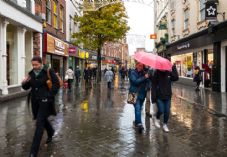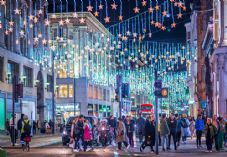UK DIY News
Springboard: Black Friday Footfall Forecast To Plunge By -59%

Retail Intelligence experts Springboard, forecast that this year UK footfall will be 59% lower than 2019 across all UK retail destinations on Black Friday, and 58% lower over the three days from Friday to Sunday. As non-essential retail remains closed, England is forecast to be hardest hit with a decline of -61.7% across all destinations on Black Friday and -60.6% over the weekend.
Black Friday is typically the start of the Christmas season and is the first key signifier of what retailers can expect during the most important trading period of the year. This year, Black Friday weekend will be like no other as the continued government restrictions due to COVID-19 are expected to slash footfall figures drastically across the UK. However, what will prove vital for the retail sector is to what extent high streets have learnt to adapt to the lockdown environment.
Springboard anticipate that high streets are expected to be the hardest hit with a -67.3% YoY drop in footfall across the weekend and -68.3% on Black Friday itself. For high streets the opportunity over Black Friday is likely to focus on larger city centres where department stores and larger multiple retailers are able to accommodate click and collect services more easily.
Shopping centres are likely to benefit more than high streets due to the greater concentration of larger multiple stores. Springboard forecast that footfall in shopping centres on Black Friday will be 65.8% lower than in 2019 and over the weekend as a whole footfall in shopping centres will be 64.7% lower than in the year before.
As has been the case all the way through the pandemic, retail parks will be far stronger over the Black Friday weekend with a forecast decline in footfall of only -31.9% on Black Friday and -30.7% over the three days from Friday to Sunday. Underpinning this is the ongoing activity generated through the presence of essential food stores which are able to remain open (75% of retail parks have large food stores). Visits to these stores are likely to be heightened by offers they introduce on non-food products such as toys, games and clothing.
In addition, the presence of electrical retailers on retail parks - which are particularly attractive stores to consumers on Black Friday due to their compelling discounting - together with the accessibility and free parking of retail parks, indicates that shoppers will gravitate to these locations in preference to shopping centres and high streets.
Diane Wehrle, Insights Director at Springboard commented:
“It goes without saying that Black Friday this year will be like no other. In previous years - and it must be remembered that Black Friday has really only been a fixture in the annual retail calendar since 2013 - shifts in footfall on Black Friday have ranged between +9.8% (2014) and -5.4% (2018) from Black Friday in the year before. Needless to say due to the lockdown in England, all products bar those available in essential stores will need to be purchased online, so online spend will undoubtedly increase substantially.
Some of this online spend will of course have been driven by the lockdown, however, it reflects the even greater significance of online spend that is likely over Black Friday. For bricks and mortar stores, particularly in England, the opportunity over Black Friday will largely be limited to their ability to provide click and collect facilities, which is the only option for shoppers to purchase goods at non-essential stores.”
In the recently published by Springboard-AL Marketing “Unwrapping Christmas with Covid” report, 70% of shoppers are intending to shop online more on Black Friday than last year. In light of the national lockdown in England, whereby non-essential stores are closed, internet shopping is likely to be bigger on Black Friday 2020 than ever before.
Looking beyond Black Friday, with the month lockdown in England due to end on 2 December and the Tier 4 restrictions in Scotland ending on 12 December, Springboard anticipate that there will be a sudden and noticeable bounce back in footfall which could be up to +40%. Therefore, there is hope for bricks and mortar retailers if they are able to be open for trading in December. Footfall data in Wales over the first seven days after the end of its 17 day firebreak demonstrates this – over the first seven days after the end of the firebreak the year on year decline in footfall improved to -27.8% from an average decline of -72.4% during the firebreak.
Source : Springboard
I find the news and articles they publish really useful and enjoy reading their views and commentary on the industry. It's the only source of quality, reliable information on our major customers and it's used regularly by myself and my team.











































